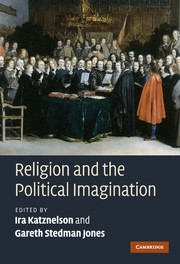Book contents
- Frontmatter
- Contents
- List of contributors
- Acknowledgements
- Introduction: multiple secularities
- 1 Secularisation: religion and the roots of innovation in the political sphere
- 2 Regarding toleration and liberalism: considerations from the Anglo-Jewish experience
- 3 The Enlightenment, the late eighteenth-century revolutions and their aftermath: the ‘secularising’ implications of Protestantism?
- 4 In the lands of the Ottomans: religion and politics
- 5 The Russian Orthodox Church and secularisation
- 6 The American experience of secularisation
- 7 French Catholic political thought from the deconfessionalisation of the state to the recognition of religious freedom
- 8 Religion and the origins of socialism
- 9 From 1848 to Christian Democracy
- 10 The disciplining of the religious conscience in nineteenth-century British politics
- 11 Colonial secularism and Islamism in North India: a relationship of creativity
- 12 The 1960s
- 13 Gendering secularisation: locating women in the transformation of British Christianity in the 1960s
- 14 Does constitutionalisation lead to secularisation?
- 15 Europe's uneasy marriage of secularism and Christianity since 1945 and the challenge of contemporary religious pluralism
- 16 On thick and thin religion: some critical reflections on secularisation theory
- Index
14 - Does constitutionalisation lead to secularisation?
Published online by Cambridge University Press: 05 June 2012
- Frontmatter
- Contents
- List of contributors
- Acknowledgements
- Introduction: multiple secularities
- 1 Secularisation: religion and the roots of innovation in the political sphere
- 2 Regarding toleration and liberalism: considerations from the Anglo-Jewish experience
- 3 The Enlightenment, the late eighteenth-century revolutions and their aftermath: the ‘secularising’ implications of Protestantism?
- 4 In the lands of the Ottomans: religion and politics
- 5 The Russian Orthodox Church and secularisation
- 6 The American experience of secularisation
- 7 French Catholic political thought from the deconfessionalisation of the state to the recognition of religious freedom
- 8 Religion and the origins of socialism
- 9 From 1848 to Christian Democracy
- 10 The disciplining of the religious conscience in nineteenth-century British politics
- 11 Colonial secularism and Islamism in North India: a relationship of creativity
- 12 The 1960s
- 13 Gendering secularisation: locating women in the transformation of British Christianity in the 1960s
- 14 Does constitutionalisation lead to secularisation?
- 15 Europe's uneasy marriage of secularism and Christianity since 1945 and the challenge of contemporary religious pluralism
- 16 On thick and thin religion: some critical reflections on secularisation theory
- Index
Summary
In this chapter I enquire, what role does constitutionalisation play in secularisation? In particular, I will ask whether the constitutionalisation of a European legal order plays a role in secularisation. By ‘constitutionalisation’ I do not mean necessarily the adoption of a document entitled ‘constitution’, but rather a fundamental legal ordering, underpinning the state or a supra-state entity. All European states are based on a constitutional order, including the UK, which does not have a written constitution. The secular or religious nature of each European state is formulated by its constitution, but also by European regional treaties, which have constitutional implications for their member states.
The status of religion within constitutions is interesting and unique, because of the primordial character of religion as a social and political institution. In the emergence of modernity, constitutionality of states has superseded religion (or divine authority) as the fundamental legitimate source of authority. But this is by no means a completed or irreversible process. Even within the modern nation state, including in European states, remnants of an earlier order remain. Any national or international legal regulation necessarily operates over these underlying historical layers.
I will look at one important example of constitutional change: the role played by the European Convention on Human Rights, a fundamental legal document of the Council of Europe, in changing the legal landscape of Europe, and ask whether it led to secularisation in European states.
- Type
- Chapter
- Information
- Religion and the Political Imagination , pp. 295 - 313Publisher: Cambridge University PressPrint publication year: 2010
- 2
- Cited by

